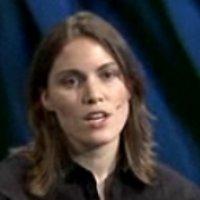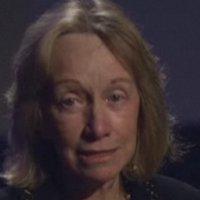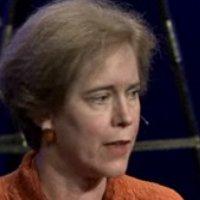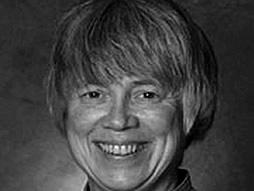Susan notes: Thanks to TED for making TED Talks downloadable and embeddable, and for providing the biographical information that goes along with them.
 Emily Oster re-examines the stats on AIDS in Africa from an economic perspective and reaches a stunning conclusion: Everything we know about the spread of HIV on the continent is wrong.
Emily Oster re-examines the stats on AIDS in Africa from an economic perspective and reaches a stunning conclusion: Everything we know about the spread of HIV on the continent is wrong.
Emily Oster, a fellow at the Becker Center at the University of Chicago, has a history of rethinking conventional wisdom.
Her Harvard doctoral thesis took on famed economist Amartya Sen and his claim that 100 million women were statistically missing from the developing world. He blamed misogynist medical care and outright sex-selective abortion for the gap, but Oster pointed to data indicating that in countries where Hepetitis B infections were higher, more boys were born. Through her unorthodox analysis of medical dat, she accounted for 50% of the missing girls.
2009-10-14
Posted in TED Talks (Individual)
Susan notes: Thanks to TED for making TED Talks downloadable and embeddable, and for providing the biographical information that goes along with them.
 Historian Doris Kearns Goodwin talks about what we can learn from American presidents, including Abraham Lincoln and Lyndon Johnson. Then she shares a moving memory of her own father, and of their shared love of baseball.
Historian Doris Kearns Goodwin talks about what we can learn from American presidents, including Abraham Lincoln and Lyndon Johnson. Then she shares a moving memory of her own father, and of their shared love of baseball.
Doris Kearns Goodwin is one of the great popularizers of presidential history. Her books on Lyndon Johnson, the Kennedys, and the wartime Roosevelts all became best-sellers, thanks to her ability to tell a truly human story around these larger-than-life men and women.
Her latest book, Team of Rivals, follows Abraham Lincoln, a brilliant young country lawyer, as he rises to the US Presidency and draws his former political opponents into his circle of advisors. (The book is the basis for Steven Spielberg's next film.)
2009-10-14
Posted in TED Talks (Individual)
 In this uplifting talk, Katherine Fulton sketches the new future of philanthropy -- one where collaboration and innovation allow regular people to do big things, even when money is scarce. Giving five practical examples of crowd-driven philanthropy, she calls for a new generation of citizen leaders.
In this uplifting talk, Katherine Fulton sketches the new future of philanthropy -- one where collaboration and innovation allow regular people to do big things, even when money is scarce. Giving five practical examples of crowd-driven philanthropy, she calls for a new generation of citizen leaders.
Billions of dollars are spent on philanthropy each year, but the way they are spent is changing rapidly. Katherine Fulton's team at Monitor Group has been tracking these changes, and she has become an eloquent advocate for the “New Philanthropy,” surprising audiences with her insights on an underreported phenomenon of momentous significance.
2009-10-14
Posted in TED Talks (Individual)
Susan notes: Thanks to TED for making TED Talks downloadable and embeddable, and for providing the biographical information that goes along with them.
 Mae Jemison is a poster child for an education that combines arts and sciences. As she says, "I always knew I'd go to space." Trained as an engineer, Jemison is a medical doctor, and she practiced in LA before becoming the Peace Corps' Medical Officer for Sierra Leone and Liberia. While running that effort, she researched Hepatitis B, schistosomaisis and rabies with the CDC and NIH.
Mae Jemison is a poster child for an education that combines arts and sciences. As she says, "I always knew I'd go to space." Trained as an engineer, Jemison is a medical doctor, and she practiced in LA before becoming the Peace Corps' Medical Officer for Sierra Leone and Liberia. While running that effort, she researched Hepatitis B, schistosomaisis and rabies with the CDC and NIH.
Back in the US, she'd returned to her California practice when selected in 1987 for NASA's astronaut program. She was the science mission specialist on STS-47 Spacelab-J (September 12-20, 1992), a cooperative mission between the United States and Japan.
2009-10-13
Posted in TED Talks (Individual)
Susan notes: Thanks to TED for making TED Talks downloadable and embeddable, and for providing the biographical information that goes along with them.
 Savage-Rumbaugh's work with bonobo apes, which can understand spoken language and learn tasks by watching, forces the audience to rethink how much of what a species can do is determined by biology -- and how much by cultural exposure.
Savage-Rumbaugh's work with bonobo apes, which can understand spoken language and learn tasks by watching, forces the audience to rethink how much of what a species can do is determined by biology -- and how much by cultural exposure.
Into the great debate over intelligence and instinct -- over what makes us human -- Susan Savage-Rumbaugh has thrown a monkey wrench. Her work with apes has forced a new way of looking at what traits are truly and distinctly human, and new questions about whether some abilities we attribute to "species" are in fact due to an animal's social environment. She believes culture and tradition, in many cases more than biology, can account for differences between humans and other primates.
2009-10-13
Posted in TED Talks (Individual)
 Emily Oster re-examines the stats on AIDS in Africa from an economic perspective and reaches a stunning conclusion: Everything we know about the spread of HIV on the continent is wrong.
Emily Oster re-examines the stats on AIDS in Africa from an economic perspective and reaches a stunning conclusion: Everything we know about the spread of HIV on the continent is wrong. Historian Doris Kearns Goodwin talks about what we can learn from American presidents, including Abraham Lincoln and Lyndon Johnson. Then she shares a moving memory of her own father, and of their shared love of baseball.
Historian Doris Kearns Goodwin talks about what we can learn from American presidents, including Abraham Lincoln and Lyndon Johnson. Then she shares a moving memory of her own father, and of their shared love of baseball. In this uplifting talk, Katherine Fulton sketches the new future of philanthropy -- one where collaboration and innovation allow regular people to do big things, even when money is scarce. Giving five practical examples of crowd-driven philanthropy, she calls for a new generation of citizen leaders.
In this uplifting talk, Katherine Fulton sketches the new future of philanthropy -- one where collaboration and innovation allow regular people to do big things, even when money is scarce. Giving five practical examples of crowd-driven philanthropy, she calls for a new generation of citizen leaders. Mae Jemison is a poster child for an education that combines arts and sciences. As she says, "I always knew I'd go to space." Trained as an engineer, Jemison is a medical doctor, and she practiced in LA before becoming the Peace Corps' Medical Officer for Sierra Leone and Liberia. While running that effort, she researched Hepatitis B, schistosomaisis and rabies with the CDC and NIH.
Mae Jemison is a poster child for an education that combines arts and sciences. As she says, "I always knew I'd go to space." Trained as an engineer, Jemison is a medical doctor, and she practiced in LA before becoming the Peace Corps' Medical Officer for Sierra Leone and Liberia. While running that effort, she researched Hepatitis B, schistosomaisis and rabies with the CDC and NIH. Savage-Rumbaugh's work with bonobo apes, which can understand spoken language and learn tasks by watching, forces the audience to rethink how much of what a species can do is determined by biology -- and how much by cultural exposure.
Savage-Rumbaugh's work with bonobo apes, which can understand spoken language and learn tasks by watching, forces the audience to rethink how much of what a species can do is determined by biology -- and how much by cultural exposure.